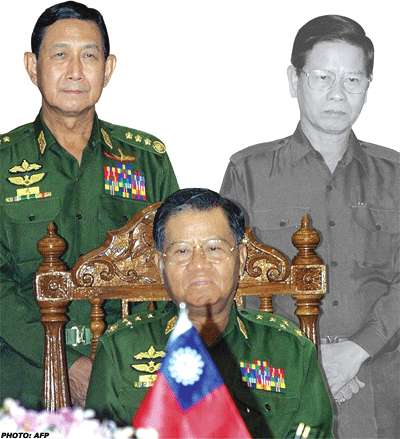One Down, Two to Go
The purge in
The sacking of Prime Minister Gen Khin Nyunt in mid-October came as no great surprise.
As Burma’s spymaster for 20 years, Khin Nyunt finally succumbed to his rival Deputy Sr-Gen Maung Aye, who is the vice-chairman of the ruling State Peace and Development Council, or SPDC, and the army chief. Legions of officers associated with the ousted PM have been detained.

Appointed vice chairman of the ruling junta in 1992, Maung Aye is a career soldier who analysts said wanted to steer the armed forces away from politics. But, he once quipped to his close friends, “I can’t do anything because my hands are tied [by Khin Nyunt].”
Many
Junta chairman and Armed Forces Commander in Chief Than Shwe has long been engaged in a balancing act with the two strongmen, but finally sided with Maung Aye. It isn’t the first time a purge has shaken up the armed forces.
In 1983, powerful intelligence chief Brig-Gen Tin Oo (no relation to opposition leader Tin Oo) was arrested on corruption charges, and several hundred officers were forced to “retire”. His authority had grown to such an extent that he earned the tag “Number One and a Half”, a play on dictator Gen Ne Win’s nickname, “Number One”. Tin Oo’s growing intelligence empire finally convinced Ne Win to get rid of the head spook.
Similarly, Khin Nyunt’s expanding authority cramped the style of many high-powered army toughies. His workaholic tendencies and high profile allowed him to increase his influence to the point that several of
Sometimes labeled a “moderate” or a “pragmatist”, Khin Nyunt was considered among the least corrupt of
Khin Nyunt, of course, is no angel; he and his MI units were involved in the 1988 massacre against democracy protestors and he instigated the chaos that paved the way for the army to take power. He also recruited skilled and shrewd military intelligence officers into the Office of Strategic Studies, or
Likewise, individual MI officers were ubiquitous in business, running massage parlors, hotels, karaoke lounges and issuing publishing licenses in
1 | 2 | 3 | 4 | 5 | 6 | 7 next page »
